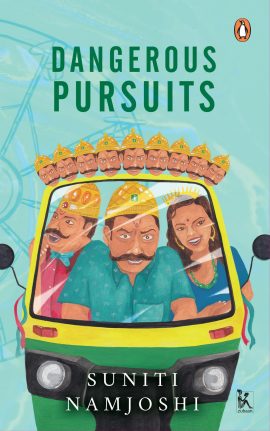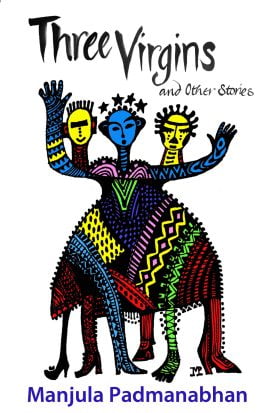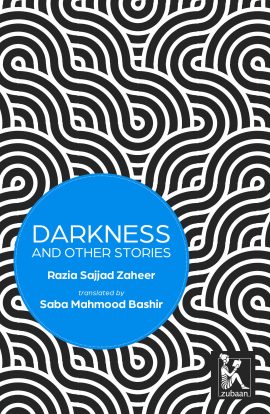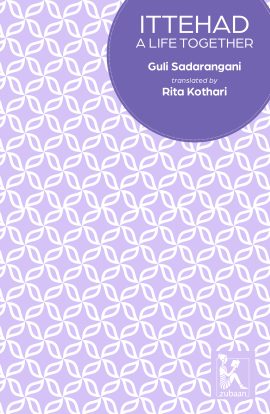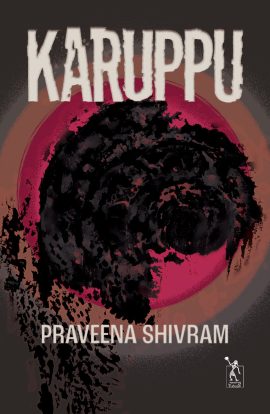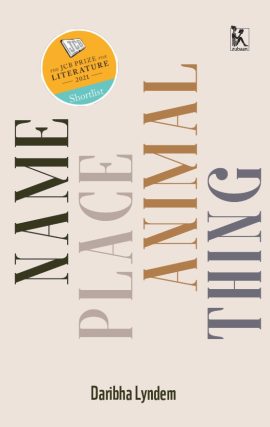No products in the cart.
Return To Shop
Log in / Sign in
Login
Register
Dangerous Pursuits
From ₹ 250During the current COVID-19 surge we are shipping orders from Delhi once per week. Please allow 8-10 business days for delivery.
Hilarious, lyrical, witty and disturbing, these three different tales all point to the question: if all our dreaming ends in distortion and disappointment, what may we do? Write ourselves off as a failed species and let climate change lead us to well-deserved oblivion? Or keep trying to do better with more humility and an acceptance that perfection remains a distant signpost?In “Bad People”, Ravana, Shupi and Kumbh manage to make the world veer from its destructive course and buy time for us. Ravana, of course, belongs to epic—but how does he fit into the twenty-first century? With the help of Grandma Ketumati’s balm, these three “bad” people outwit contemporary villains. In “Heart’s Desire”, an old woman seeks to make a bargain with the devil, but the devil isn’t interested, and she finds herself stuck with two angels. She and the angels do their best, but the old woman learns that a happy end and heart’s desire are not synonymous.And in “The Dream Book”, based on The Tempest, Caliban, Miranda, Prospero and the rest find that their dreams clash and lie there as pretty and pitiless as glass shards. Yet, each time they engage once again in this dangerous pursuit.“She is a fabulist who is never preachy. A feminist who is never humourless. A poet who is never arcane. An intellectual who is never pedantic… Her work points to a deeply internalized radicalism, one that has as much depth as it has edge. Quirky, funny, intellectually agile, capable of making connections between the mundane and the metaphysical, adept at sniffing out the archetypal in the culturally particular, they point to a mind that is as engaged as it is engaging.“ — Arundhati Subramaniam
SUNITI NAMJOSHI is a poet, a fabulist and a children’s writer who has written over thirty books. After a stint in the Indian Administrative Service, Namjoshi moved to Canada where she earned a PhD at McGill University, and then moved on to doing what she loves best: writing. A selection of her writings is published in The Fabulous Feminist (Zubaan, 2012). Suki (Zubaan-Penguin, 2013), a memoir about her beloved cat is both a book about a relationship and an elegy. Her recent work, Foxy Aesop: On the Edge asks point-blank whether it is the function of writers to save the world.
Off The Beaten Track
₹ 499
Saeeda Bano was the first woman in India to work as a radio newsreader, and she is still known as the doyenne of Urdu broadcasting. Over her unconventional and courageous life, Bano walked out of a suffocating marriage, witnessed the violence of Partition, lost her son for a night in a refugee camp, ate toast with Nehru, and fell in love with a married man who would, in the course of their twenty-five year-relationship, become the Mayor of Delhi. Though she was born into privilege in Bhopal—the only Indian state to be ruled by women for four successive generations—her determination, independence, and frankness provide a unique and crucial disruption in India’s understanding of the past. Translated from Urdu by Bano’s granddaughter, Off the Beaten Track is a frank and brave memoir about the remarkable life of a single woman in mid-twentieth-century India.
SAEEDA BANO is the first woman in India to work as a radio newsreader.SHAHANA RAZA is Saeeda Bano's grand-daughter. She has a Master's in Film and Viedo Production and has worked in television, radio and other print media. A liberal feminist, Shahana is an independent writer and video producer, a wannabe vegan and a dilettante environmentalist. She currently lives in Dubai with her husband and two children.
Add to cart
“Generously studded with jewel-bright Urdu and Farsi verses, ably translated by the author's granddaughter Shahana Raza, the narrative retains the flavour of its Urdu original. It reminds us of a time when even those with little formal education had a wide frame of literary references and a world view that was eclectic and liberal.“ — India Today
“But, what makes this memoir an important one, is also her professional strides at AIR. When AIR launched its Urdu service, she began taking on more programming work, leading a Women and Children's show, analysing news, broadcasting short bulletins, and also producing a five-minute show called Dekhi-Suni. In her memoir, she writes about this very matter-of-factly.“ — Midday
SAEEDA BANO is the first woman in India to work as a radio newsreader.SHAHANA RAZA is Saeeda Bano's grand-daughter. She has a Master's in Film and Viedo Production and has worked in television, radio and other print media. A liberal feminist, Shahana is an independent writer and video producer, a wannabe vegan and a dilettante environmentalist. She currently lives in Dubai with her husband and two children.
Three Virgins and Other Stories
From ₹ 250
Author-artist Manjula Padmanabhan returns with ten stories: five new, five old, some dark, some funny, all edgy.A vampire visits New Delhi, a space traveller returns to her ancestral home, a character from an ancient epic is transported into the future... To each story Padmanabhan brings an unexpected twist, a touch of satire, a whiff of cynicism, a delicious undercurrent of dark humour.Drawing on her earlier, highly acclaimed anthology, Hot Death Cold Soup, and adding new stories to it, Padmanabhan presents a potent and sometimes disturbing collection that will leave readers asking for more.
Select format
This product has multiple variants. The options may be chosen on the product page "She revels in the macabre, pushes the envelope on the extreme... Her stories and plays work so masterfully on so many levels?as twist-in-the-tale page-turners, as on-the-edge adventures, as miniature theatres of the absurd that the reader's imagination plays almost as singular a part in them as the writer's." -- Sumana Mukherjee, The Hindu"The best thing about these stories is their momentum, their narrative drive. You keep turning the pages and there is always a pay-off at the end.... Hot Death, Cold Soup not only stays afloat, it fairly zips along, it flies." -- Mukul Kesavan, Outlook "Padmanabhan is aware of the fact that a story can grab a reader with the use of humour. But the hooks sink in when even the farfetched sounds plausible?That is her real strength ? to make the reader feel comfortable, and still keep him guessing." -- Arun Katiyar, India Today
Darkness and Other Stories
From ₹ 350Razia Sajjad Zaheer’s stories are gentle and unassuming tales that describe the lives of ordinary women—a homemaker, a teacher, a writer, a sex worker—whose struggles simply to be themselves, or to make sense of the realities they see around them, mark them as extraordinary. A low caste woman shows up society’s hypocrisy in dealing with caste and, in doing so, turns the mirror on her own tendency to do the same. A working woman, a mother and writer, grapples with how to deal with her over-helpful house help, a man, who thinks he knows that when she asks for tea, he must instead serve her milk. A writer travels alone on a train at night, fearful that she may be attacked by the sinister-seeming men around her, only to find that they are fans of her writing. Every story offers a situation that readers may easily recognise and relate to, and each then suggests a complex twist or an ambivalence that is sometimes elusive and sometimes illuminating. Saba Mahmood Bashir’s competent and accessible translation brings the work of this important writer—which has thus far received little attention—to life for readers of today.
_____________________________________________________________________________________Razia Sajjad Zaheer, commonly known as Razia Apa in literary circles, was born in 1917 in Rajasthan. At the age of 20, she married Sajjad Zaheer, a member of the Communist Party and one of the founders of the Progressive Writers’ Association. She got a Master’s degree in Allahabad. Her life changed when, shortly after she married, her husband was given a two-year prison sentence for his revolutionary activities. Razia took to writing, teaching and translating to make ends meet and, over time, managed the running of the household as well. She worked hard to bring her husband’s works to public attention, and continued to write alongside. She received several awards for her work, including the Nehru Award (1966) and the Uttar Pradesh Sahitya Akademi Award (1972). She passed away in 1979.
Saba Mahmood Bashir is a poet, author, translator, and assistant professor at the Department of English, Jamia Millia Islamia, New Delhi. She did her doctorate on the poetry of Gulzar. Her first book was a collection of poems, Memory Past (2006), and was followed by several others including I Swallowed the Moon: The Poetry of Gulzar (2013). She has also translated Gulzar’s screenplays of Munshi Premchand’s Godaan and Nirmala and Other Stories (2016) along with fiction by Premchand and Saadat Hasan Manto. Her recent books are Aandhi: Insights Into the Film and Women of Prey, a translation of selected stories by Manto.
Ittehad: A Life Together
From ₹ 350Known and celebrated in her time, Guli Sadarangani, the first woman writer of Sindh, later sank into oblivion. Perhaps this was because she dared to write about a Hindu-Muslim romance that culminated in marriage. The novel that told this story, Ittehad, was first published in undivided India, and later appeared under another title, Melaapi Jeevan. Rita Kothari’s elegant and empathetic translation of the love story of Asha and Hamid teases out the nuances of their understated relationship and reveals how pre-Independence and pre-Partition India held so many possibilities of living and loving together. Perhaps that is why, the translator speculates, members of the Sindhi community trying to find their feet in post-Partition India were uncertain of showcasing a writer whose writings represented a world that no longer seemed possible.
______________________________________________________________________________________Guli Sadarangani (1906-1994) was the first woman writer of Sindh. She was a courageous writer who wrote about a difficult subject—Hindu-Muslim relations at a time when tensions between the two communities were growing and the shadow of Partition loomed. In the annals of literature in Indian languages, and more specifically in Sindhi literature, she has remained largely invisible, not only because of her choice of subject but also the language in which she wrote, Sindhi, which itself was not accorded the status of an important literary language. This is the first English translation of her work.
Rita Kothari is professor of English at Ashoka University. An accomplished writer, multilingual scholar and translator, she is also co-director of the Ashoka Centre for Translation. She has translated extensively from Gujarati and Sindhi into English, and vice versa. She has a body of important work on the Sindhi experience of Partition, particularly her book The Burden of Refuge: Partition Experiences of the Sindhis of Gujarat (2009). Her most recent book, Uneasy Translations: Self, Experience and Indian Literature (2022), interweaves her personal journey as an academic into reflections around self, language, and translation.
Books, e-Books, Literature for Young Adults, Literature for Young Adults, New Releases, New Releases, Young Zubaan, Young Zubaan
Karuppu
From ₹ 325
Karuthamma, born to a Yamadoot, turns fourteen on Earth while Sigappan, an intersex child taken to the underworld in exchange, grows up with the Yamadoots. When their paths cross, the world is at the brink of destruction.Yama has disappeared. His twin Yami, an immortal on Earth, is trying to hold the fort. At the centre of the chaos is one person: Yami’s daughter. Karuthamma’s birth mother. Sigappan’s adopted mother. Yama’s only female Yamadoot: Karuppu.In the underworld death, dreams, and memories are living, breathing entities, and carry with them seeds of quiet hope. This is not a retelling or reimagining of myth—but a re-building of a world facing the terrifying consequences of single-minded devotion.
PRAVEENA SHIVRAM is an independent writer based in Madras. She holds a Master’s in Writing for Performance and Publication from the University of Leeds, UK, and a PG Diploma in Social Communications Media from Sophia Polytechnic, Mumbai. She is a single mother who loves both her children as much as she loves to deadlift. She firmly believes that the answer to life, the universe and everything is embedded in an afternoon nap.
Select format
This product has multiple variants. The options may be chosen on the product page PRAVEENA SHIVRAM is an independent writer based in Madras. She holds a Master’s in Writing for Performance and Publication from the University of Leeds, UK, and a PG Diploma in Social Communications Media from Sophia Polytechnic, Mumbai. She is a single mother who loves both her children as much as she loves to deadlift. She firmly believes that the answer to life, the universe and everything is embedded in an afternoon nap.
Swimming in Our Oceans: A Memoir by Pragya Bhagat
From ₹ 325
Swimming In Our Oceans traverses the uncertainties and contradictions that shape who we are. The memoir explores performance, invisibility, and mental health, following Pragya's move to a village in Uttarakhand. Alternating between the author’s past and present, Swimming in Our Oceans questions what it means to belong – to a place, to a person, to oneself.
PRAGYA BHAGAT is a poet and essayist. Her work explores the intersections between belonging, body image, and mental health. Her work has been featured in the BBC, The Alipore Post, The Huffington Post, Kommune, and The Wire, amongst others. She currently lives in Goa where she hosts a fortnightly meet-up called The Poetry Circle.
Select format
This product has multiple variants. The options may be chosen on the product page PRAGYA BHAGAT is a poet and essayist. Her work explores the intersections between belonging, body image, and mental health. Her work has been featured in the BBC, The Alipore Post, The Huffington Post, Kommune, and The Wire, amongst others. She currently lives in Goa where she hosts a fortnightly meet-up called The Poetry Circle.
A Small Step in a Long Journey: A Memoir by Akkai Padmashali
From ₹ 325
More than just an autobiography or memoir, this is a powerful and passionate account of one woman’s battle to claim her identity and place in society. In A Small Step in a Long Journey, Akkai Padmashali, a trans rights activist and campaigner, thinker, writer, poet, and actor, throws out a challenge to society, demanding not sympathy or pity but acceptance, recognition, and respect. Brutally honest and self-critical, Akkai’s writing is a political act in which she lays bare the hurt, humiliation, confusion, insult, love, solidarity, and joy that went into making her who she is today.Time and again Akkai asserts that her story is not just her story. What we call gender and sexuality, she says, ‘is a journey we all travel’, one that connects our personal and political lives, and one that helps us to face difficult, disturbing questions about prejudice and privilege.
AKKAI PADMASHALI is a trans rights activist, writer, singer, performer, and motivational speaker. She has been a champion for queer and trans rights, an advocate for policy change and a recipient of Karnataka government second highest civilian honour, the Rajyotsava Prashasti. She has also received an honorary doctorate from the Indian Virtual University for Peace and Education. Founder of Ondede, a human rights organization, Akkai’s was among the leading voices opposing Section 377 of the Indian Penal Code, which criminalized homsexuality. She has been a strong critic of the Transgender Persons (Protection of Rights) Act, 2019 and the 2018 and 2016 bills that preceded it.
Select format
This product has multiple variants. The options may be chosen on the product page “…leaves you unsettled. Akkai means to disturb and disrupt us.” — Vrinda Grover, lawyer and women’s rights activist
“Akkai Padmashali’s forceful and eloquent new book, A Small Step in a Long Journey, tells of the awe-inspiring life of this eminent activist. From the harrowing abuse she has faced to her ironclad determination to change attitudes toward the transgender community, Akkai’s story is an indictment of society’s cruelty toward those it deems to be different, and an inspiration to anyone who wishes for a more just world.” — Shashi Tharoor, author and politician
AKKAI PADMASHALI is a trans rights activist, writer, singer, performer, and motivational speaker. She has been a champion for queer and trans rights, an advocate for policy change and a recipient of Karnataka government second highest civilian honour, the Rajyotsava Prashasti. She has also received an honorary doctorate from the Indian Virtual University for Peace and Education. Founder of Ondede, a human rights organization, Akkai’s was among the leading voices opposing Section 377 of the Indian Penal Code, which criminalized homsexuality. She has been a strong critic of the Transgender Persons (Protection of Rights) Act, 2019 and the 2018 and 2016 bills that preceded it.
Intimate City
From ₹ 420
In this one-of-a-kind book, Manjima Bhattacharjya examines how globalization and technology have changed where and how sexual commerce is transacted. From changing red light areas to the world of escort services, massage boys and men in search of casual encounters cruising the internet highways, this book maps offline and online geographies of sex work and unearths voices never heard before. Through these fascinating narratives, Bhattacharjya tries to understand how the internet has re-configured intimacies in the digital age. In doing so, she offers a new lens to look at long-held feminist understandings of sex work, choice, consent and agency against the backdrop of the ‘maximum city’: Mumbai.
MANJIMA BHATTACHARJYA is a feminist researcher, writer and activist based in Mumbai. She has been part of the Indian women’s movement for over two decades. She holds a PhD in sociology. Her areas of specialization include gender and sexuality, and labour and the body. She is the author of Mannequin: Working Women in India’s Glamour Industry (Zubaan 2018).
Select format
This product has multiple variants. The options may be chosen on the product page MANJIMA BHATTACHARJYA is a feminist researcher, writer and activist based in Mumbai. She has been part of the Indian women’s movement for over two decades. She holds a PhD in sociology. Her areas of specialization include gender and sexuality, and labour and the body. She is the author of Mannequin: Working Women in India’s Glamour Industry (Zubaan 2018).
Books, Books from the North East, Books from the North East, e-Books, Fiction, Fiction, New Releases, Non-Fiction, Non-Fiction
The Inheritance of Words: Writings from Arunachal Pradesh
From ₹ 350
A first of its kind, this book brings together the writings of women from Arunachal Pradesh in Northeast India. Home to many different tribes and scores of languages and dialects, once known as a ‘frontier’ state, Arunachal Pradesh began to see major change after it opened up to tourism and once the Indian State introduced Hindi as its official language. In this volume, Mamang Dai, one of Arunachal’s best known writers, brings together new and established voices on subjects as varied as identity, home, belonging, language, Shamanism, folk culture, orality and more. Much of what has been handed down orally, through festivals, epic narratives, the performance of rituals by Shamans and rhapsodists, revered as guardians of collective and tribal memory, is captured here in the words of young poets and writers, as well as artists and illustrators, as they trace their heritage, listen to stories and render them in newer forms of expression.
Contributors: Ayinam Ering | Bhanu Tatak | Chasoom Bosai | Doirangsi Kri | Gedak Angu | Gyati T. M. Ampi | Ing Perme | Jamuna Bini | Karry Padu | Kolpi Dai | Leki Thungon | Mamang Dai | Millo Ankha| Mishimbu Miri | Nellie N. Manpoong | Ngurang Reena | Nomi Maga Gumro | Omili Borang | Ponung Ering Angu | Rebom Belo | Rinchin Choden | Ronnie Nido | Samy Moyong | Stuti Mamen Lowang | Subi Taba | Takhe Moni | Tine Mena | Toko Anu | Tolum Chumchum | Tongam Rina | Tunung Tabing | Yaniam Chukhu | Yater Nyokir
MAMANG DAI is a poet and novelist. A former journalist, she has worked with World Wildlife Fund in the Eastern Himalaya Biodiversity Hotspots programme. Her first book, Arunachal Pradesh: The Hidden Land, received the State Verrier Elwin Prize. She is a recipient of the Padma Shri (Literature and Education) and the Sahitya Akademi Award. She currently lives in Itanagar, Arunachal Pradesh.
Select format
This product has multiple variants. The options may be chosen on the product page Contributors: Ayinam Ering | Bhanu Tatak | Chasoom Bosai | Doirangsi Kri | Gedak Angu | Gyati T. M. Ampi | Ing Perme | Jamuna Bini | Karry Padu | Kolpi Dai | Leki Thungon | Mamang Dai | Millo Ankha| Mishimbu Miri | Nellie N. Manpoong | Ngurang Reena | Nomi Maga Gumro | Omili Borang | Ponung Ering Angu | Rebom Belo | Rinchin Choden | Ronnie Nido | Samy Moyong | Stuti Mamen Lowang | Subi Taba | Takhe Moni | Tine Mena | Toko Anu | Tolum Chumchum | Tongam Rina | Tunung Tabing | Yaniam Chukhu | Yater Nyokir
MAMANG DAI is a poet and novelist. A former journalist, she has worked with World Wildlife Fund in the Eastern Himalaya Biodiversity Hotspots programme. Her first book, Arunachal Pradesh: The Hidden Land, received the State Verrier Elwin Prize. She is a recipient of the Padma Shri (Literature and Education) and the Sahitya Akademi Award. She currently lives in Itanagar, Arunachal Pradesh.
Books, Books from the North East, Books from the North East, e-Books, Fiction, Fiction, New Releases, New Releases
Name Place Animal Thing
From ₹ 300Shortlisted for the JCB Prize for Literature 2021!
'There were no longer any signs of the house we stayed in, no doorway with its low entrance, no weeping willow or cryptomeria tree from which the caterpillars fell. The ramshackle cottage that housed my earliest friends and shaped my memories lay bare and forgotten. Only the flying termites remained, fluttering below the street lights outside the property.'In this novella, Daribha Lyndem gently lifts the curtain on the coming of age of a young Khasi woman and the politically charged city of Shillong in which she lives. Like the beloved school game from which it takes its name, the book meanders through ages, lives and places. The interconnected stories build on each other to cover the breadth of a childhood, and move into the precarious awareness of adulthood.A shining debut, Name Place Animal Thing is an elegant examination of the porous boundaries between the adult world and that of a child’s.
DARIBHA LYNDEM is a writer and civil servant from Shillong. Name Place Animal Thing is her first book. She currently works with the Indian Revenue Service and a Deputy Commissioner of Customs. Daribha now lives with two cats and a husband in Mumbai.
The Business of Sex
From ₹ 395
Mainstream feminist discourse has failed to fully engage with commercial sex work. In a series of groundbreaking, previously unpublished essays, The Business of Sex corrects this lacuna.Moving beyond the traditional feminist focus on slavery and trafficking, HIV/AIDS, and other health issues, the contributors to this volume engage fully with the political and theoretical implications of sex work. Dismissing old antagonisms, they argue that feminism—thanks to its role in revolutionizing perspectives on sexuality and labor—is a natural ally for the sex workers’ rights movement. In the process, these innovative scholars provocatively critique the dominant moral paradigm of heterosexual monogamy, which has created a pervasive “victim” discourse and limited our understanding of sex work’s complex realities.Drawing on first-hand stories of sex workers and prostitutes, this volume gives voice to newly articulated movements such as “whore feminism” and “queer feminism”—feminisms that have the potential to move discussions about sex work onto new and fruitful terrain.
LAXMI MURTHY is a consulting editor at Himal Southasian and heads the Hri Institute for Southasian Research and Exchange.MEENA SARASWATHI SESHU is the general secretary of SANGRAM, an organization that works to protect the rights of sex workers and people living with HIV/AIDS in Sangli, Maharashtra.
Select format
This product has multiple variants. The options may be chosen on the product page LAXMI MURTHY is a consulting editor at Himal Southasian and heads the Hri Institute for Southasian Research and Exchange.MEENA SARASWATHI SESHU is the general secretary of SANGRAM, an organization that works to protect the rights of sex workers and people living with HIV/AIDS in Sangli, Maharashtra.
Contact Us
© Zubaan 2019. Site Design by Avinash Kuduvalli.
Payments on this site are handled by CCAvenue.

